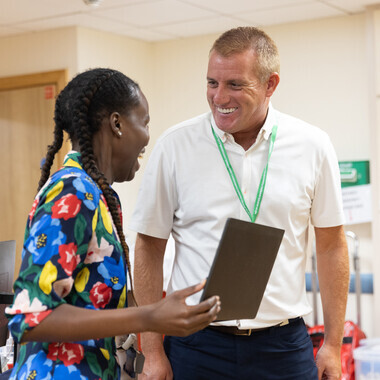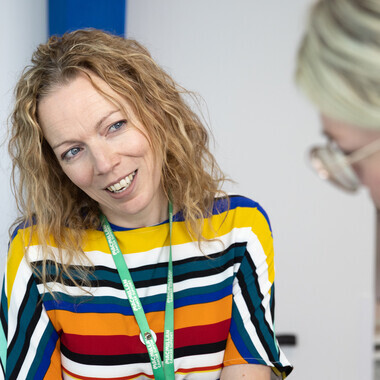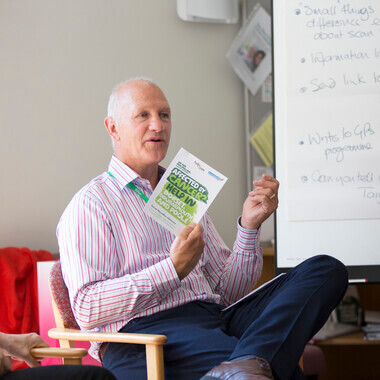
Doctors working in cancer
Types of doctors working in cancer
Doctors who specialise in working with cancer patients are called oncologists. There are other types of doctors who work with cancer patients as part of their role.
Find out more about the different types of doctors working in cancer care below:
-
Medical oncologist
Medical oncologists are doctors trained to deliver a wide range of systemic therapies to people diagnosed with cancer, including:
- chemotherapy
- immunotherapy
- biological therapies
- targeted treatments
- hormonal therapies.
Medical oncologists are different from clinical oncologists as medical oncologists do not prescribe or give radiotherapy.
Medical oncologists contribute to decisions about treatment and care as part of a multidisciplinary team (MDT).
Following a diagnosis, medical oncologists will meet with people living with cancer at out-patient clinics to discuss the best treatment options available for them and their risks and benefits
They will manage and oversee the delivery of these treatments and also play a role in follow-up care of people who they have treated being fully involved in their holistic care.
Medical oncologists will deliver acute cancer care, working with emergency and acute physicians to provide care for people experiencing complications from cancer and its treatment.
They are also often involved in research both in laboratories and in delivering clinical trials.
-
Clinical oncologist
Clinical oncologists are doctors who deliver radiotherapy and systemic therapies to treat people diagnosed with cancer. As part of a multidisciplinary team, they help decide care plans for people living with cancer.
Following a diagnosis, they will meet with people with cancer in out-patient clinic to discuss the best treatment options available for them. They will talk about the treatment and the risk and benefits to having treatment.
Clinical oncologists will manage and oversee treatment, supporting people with cancer from the beginning to end and in recovery. They are responsible for follow-up care of people they have treated and remain involved in their holistic care.
-
Hospital physician
Physicians are doctors who work in different internal medicine specialities and care for people with cancer at all stages of their journey.
Types of physicians who work with people living with cancer include:
- Gastroenterologists and respiratory physicians, who can diagnose cancer with tests such as endoscopy or bronchoscopy
- Acute physicians who manage complications of treatment when people are admitted to the emergency department
- Geriatric physicians who care for older people who may be unwell due to their cancer or other medical conditions and frailty.
-
General practitioner (GP)
GPs are doctors based in the community who treat people with minor or chronic illnesses.
GPs play an important role in cancer care and support by:
- informing people of their risks of developing cancer
- supporting people to understand screening programmes
- recognising symptoms of cancer and referring people for investigations
- supporting people diagnosed with cancer and who are going through treatment
- caring for people at the end of life.
Some GPs will work specifically in cancer and may have roles that ensure that pathways and services are in place to best support people with cancer.
-
Haematologist
Haematologists are doctors who diagnosis, treat and manage diseases of the blood and blood-producing organs. These diseases may be:
- non-cancerous such as anaemia and haemophilia
- cancerous such as leukaemia, lymphoma and myeloma.
Haematologists work in different parts of patient care, for example examining blood and bone marrow samples in the laboratory or delivering treatment for bloods cancers such as chemotherapy or stem cell transplantation.
-
Pathologists
Pathologists are medical consultants who examine tissues to determine the type of cancer someone has. They are doctors who have specialised in this field after initial training in medicine.
Pathologists examine tissue after a biopsy or surgery and may request and review many tests on the tissue that help decide on the best treatment for the type of cancer diagnosed.
As part of a multi-disciplinary team, they help provide care plans for people living with cancer. Pathologists will work in a laboratory and often specialise in one or two tumour types.
-
Surgeon
Surgeons are doctors who perform surgical procedures to diagnose, treat, and manage different conditions. Some surgeons will specialise in cancer surgery or perform cancer surgeries and other types of surgery. Most will specialise in operating on a certain part of the body or a type of operation.
Surgeons plan and perform operations on pre-booked (elective) or emergency cases. They use their knowledge of anatomy, physiology and surgical techniques.
At outpatient clinics, surgeons will meet with patients to diagnose conditions and discuss the best treatment options.
They may organise and interpret specialist tests and scans to decide if an operation is needed. If an operation is needed, they will help prepare a patient for the procedure. They may also meet with the patient after an operation, to monitor and support their recovery.
-
Radiologists
Radiologists interpret medical imaging to diagnose and treat different medical conditions, including cancer. Medical imaging includes:
- X-rays
- ultrasound
- computed tomography (CT)
- magnetic resonance imaging (MRI)
- positron emission tomography (PET)
- nuclear medicine
- molecular imaging.
In oncology, radiologists will work in a multidisciplinary team (MDT) to interpret imaging and define the radiological staging of people's cancer. They may also recommend further appropriate imaging examinations or treatments when required.
Radiologists can work in certain types of cancer, such as breast radiology, or can specialise in types of imaging, including interventional radiology.
Radiologists work closely with diagnostic radiographers and clinical oncologists at every stage of a person's cancer journey.
-
Anaesthetists
Anaesthetists are doctors who specialise in anaesthesia. They use their knowledge of anatomy, pharmacology, physiology and surgical techniques to assess patients and care for them before during and after an operation. They are responsible for:
- assessing if a person living with cancer is well enough to undergo a surgical procedure and its recovery
- talking about what type of anaesthetic might be best, and managing pain control after an operation
- looking after patients in the operating theatre and monitoring their condition throughout an operation
- supporting patients immediately after an operation in the recovery room, post-operative care unit or in a critical care unit.
Some anaesthetists are also involved in:
- Prehabilitation services – helping prepare for a treatment by improving their physical and mental health with exercise, nutrition and psychological support
- Specialist pre-assessment clinics - where anaesthetists work alongside other professionals to assess a person's risk and ensure their other conditions are well treated before the operation
- Pain management clinics - where anaesthetists work alongside a range of professionals to assess and treat people with chronic and cancer pain.
-
Palliative care consultant
A palliative care consultant leads a multidisciplinary team (MDT) and works with patients living with treatable but not curable cancer. They advise on many aspects of symptom control and other support to the wider cancer team. Depending on their training and expertise, they may also advise on long term effects of treatment for people not receiving palliative care.
They care for patients to end of life when treatment has stopped to ensure patients receive the treatment and support they prefer. They can also provide support for friends and family through linking them to wider support services.
How do I become a doctor working in cancer?
To become a doctor specialising in cancer you will need to complete a 5 year degree at a medical school.
Research different medical schools to find out about their entry requirements. In most cases you will need A and A* grades in A levels including chemistry. Some medical schools will also ask for biology, maths or physics A levels and may ask for specific GCSEs.
It may be possible to complete a medical degree in 4 years if you already have another degree.
When you have completed your medical degree, you will go on to a 2 year foundation training. This is a paid role where you will usually have 6 different work placements.
After the foundation training you will then need to do at least 2 years Internal Medical Training. You can then apply for specialty training (ST).
Specialty training levels are referred to as ST1, ST2, ST3 etc. Each level correlates to a year of full-time training.
How do I become an oncologist?
You would usually enter an oncology programme at ST3. It is a minimum of 4 years training for medical oncology and a minimum of 5 years training for clinical oncology to complete this training to become a consultant.
The Royal College of Radiologists and the Joint Royal College of Physicians Training Board have detailed information about different roles and training pathways for doctors.
How do I become a Macmillan GP?
We are currently not funding new Macmillan GP roles. We are still supporting Macmillan GPs who are funded by the organisations they work for.
Our other Macmillan Professional roles are not directly recruited by us. Instead, they are advertised and recruited through our partner organisations. We encourage those interested in working as a Macmillan Professional to apply for these roles. However, these roles may not always be available.
Whether you are in a Macmillan Professional role or another cancer role, you'll be making a difference in the lives of people with cancer.
Information and support from other organisations





